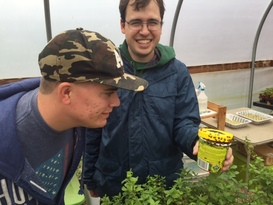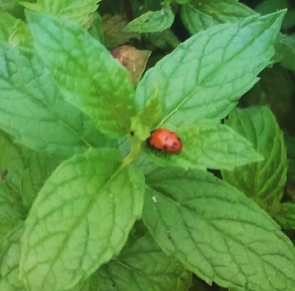
From time to time, farmers have to contend with unwanted pests consuming their crop - like aphids. A few weeks ago we noticed early-stage aphids in our mint. Although there are other organic methods for controlling aphids, ladybugs are a natural predator of aphids and we decided to pursue this remedy. The ladybugs are handling the problem well - the number of aphids has dwindled since introducing the ladybugs into our aquaponics system. We’d much rather see ladybugs munching on our mint sprigs than anything else!
What are the benefits of using ladybugs?
They’re a great way to control pests like aphids without having to use chemical spray on your plants. Any natural means of controlling insects is important for organic farmers. A fun fact about ladybugs (and an important benefit!) is that during a single ladybug’s lifetime they can consume up to 5000 aphids. Now that’s an appetite we farmers like!
How exactly do you release ladybugs so they remain in a greenhouse?
When we released our ladybugs, we kept the roll-up sides to the greenhouse nearly closed and the door shut to keep the ladybugs inside. We were also advised to release the ladybugs early in the morning on a cooler, more overcast day. Ladybugs like a bit of moisture in the air, so we also sprayed the air above where they were released to create conditions they enjoyed in the greenhouse. It also helps to release the ladybugs in stages, so the first release might be a week before the second. That provides a steady supply of ladybugs ready to do battle with the aphids.

What other beneficial insects do farmers growing sustainably use?
Farmers sometimes also use parasitic wasps to try to control certain pests. They also try to plant certain crops that will attract bees. Bees don’t kill pests, but they help pollinate crops, which is necessary for some of them to develop fruit so raising crops attractive to bees is very important.
What’s “integrated pest management?” Why is it important?
Integrated pest management is important because it’s a natural means of controlling pests - rather than pesticides that can harm the environment. It’s also more effective at keeping pests under control in the long run, because it tries to create conditions that are unfavorable for pests to grow. In order to use this integrated way of managing pests, however, you need to monitor your crops and be able to correctly identify pests. One of the things we’ve learned and been trained to do through our work at the Hannah and Friends greenhouse is to carefully observe our crops and notice the presence of existing pests right away. When we scale up to production at our expansion site, this kind of observation and management will be even more important.
What other “organic” methods control a problem like aphids?
Farmers and gardeners can also use insecticidal soap or oil sprays, or even spray the aphids with a regular hose. Some other species of pests can also be treated by using bacteria that only infect that species. For example, some organic farmers use a bacterium called Bacillus thuringiensis (Bt), which targets certain pests like beetles, caterpillars, and moths. At other times in the past, we’ve controlled pests like aphids by applying a diluted soapy solution to our plants and that works very well too.
We love our ladybugs and we hope you’ll think of using them too. They do the job in indoor greenhouses and outdoor gardens – a very beneficial insect!
- Chris Tidmarsh

 RSS Feed
RSS Feed
